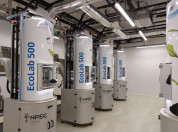Search
Filter by
Type
Tags
Dossiers
Themes
Departments
Active filters
1048 search results
Search results
-
Film 'Onder het Maaiveld' revisited - English version
To honour the International Day of Biodiversity, with NIOO soil ecologists for Q&A afterwards!
-
Open Dagen bij het NIOO
Het NIOO houdt regelmatig Open Dagen om te laten zien hoe we onderzoek doen. Op 7 oktober is het weer zover.
-
Soil multifunctionality: from biodiversity associations to understanding mechanisms (MultiSol)
My MSCA-project will elucidate the mechanisms underlying trade-offs and synergies among soil functions and reveal how differences among soils drive differences in soil multifunctionality.
-
Annemieke Drost
PhD Candidate
-
NPEC - Ecotron
NPEC’s Ecotron facility at Utrecht University consists of a range of 36 fully closed and controlled mesocosm systems that allow for real-life plant ecosystem analyses in real time.
-
Beneath your feet, soil microbes are getting fat
Microbes, like humans, can eat 'junk food' and grow fat. This even happens when you might not expect it, according to NIOO researcher Kyle Mason-Jones
-
Jos Raaijmakers elected member of the KNAW
NIOO's head of Microbial Ecology Jos Raaijmakers has been elected a member of the Royal Netherlands Academy of Arts and Sciences (KNAW).
-
Hackfort
Hackfort is an oak coppice grove in the East-Southeast of the city of Zutphen in the province of Gelderland, the Netherlands. The forest is situated at the transition from western riverine deposits and eastern periglacial cover sands.
-
Galápagos (3): Back home and prepping for data analysis
An international research team led by the Netherlands Institute of Ecology (NIOO-KNAW) has been searching for invisible life in the iconic Galápagos Islands. Part three.
-
Merlijn Schram
PhD Candidate
